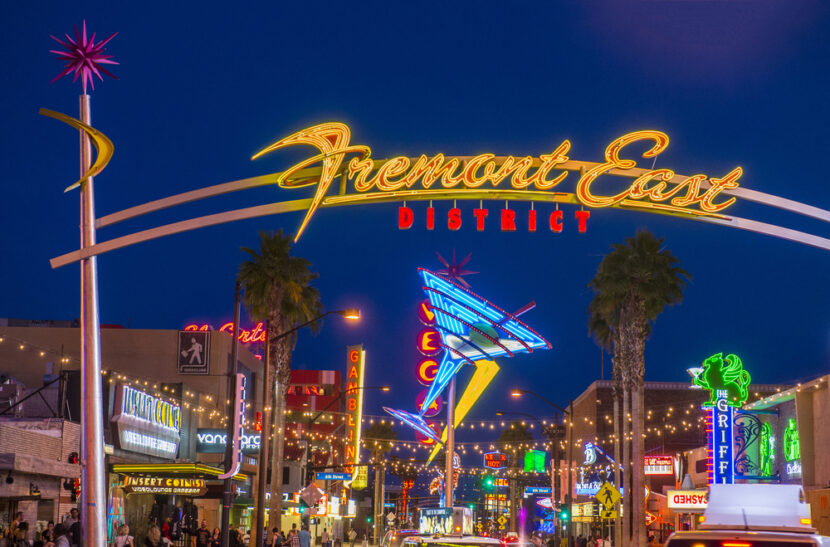LAS VEGAS — A bawdy gauntlet of street performers and tip-seeking costumed characters crowding Las Vegas’ Fremont Street have been driving tourists away, city leaders said as they moved toward imposing new rules to rein in the rowdy atmosphere.
Sin City already has banned people from drinking alcohol out of glass bottles and aluminum cans on the downtown street. Now, officials have proposed an ordinance that would set aside specific areas for performers to use between 3 p.m. and 2 a.m., requiring registration with the city.
Fremont Street is the original Vegas gambling hotspot, where casinos got their start before the Strip grew about 2 miles south. It was turned into a pedestrian mall lined with casinos and shops underneath a massive video-screen canopy and zip-line ride, where racy performers sometimes push for tips from passers-by.
Councilman Bob Coffin said Wednesday that visitors certainly expect “the sex and the nudity” that comes with Sin City, but in areas catering to it.
“They don’t expect to see women dressed as nuns with their breasts flying everywhere” and just their naughtiest parts covered, or an overweight middle-aged man wearing skimpy underwear on Fremont Street, he said.
“There’s a place for this stuff,” Coffin said, and it’s not on the tourist thoroughfare where children could be around.
While nothing in the regulations would bar either — only full-frontal nudity is not allowed — Coffin said he hopes the rules provide a structure to help the best performers excel and the others fade away.
Coffin and Councilman Ricki Barlow introduced the proposed ordinance Wednesday. Barlow said he’s heard from offended visitors unlikely to make another visit and fears word of mouth keeps others away from downtown Las Vegas.
The proposed rules won’t keep anyone from expressing themselves freely, though. Tod Story, with the American Civil Liberties Union of Nevada, said they create order that didn’t exist before, including a fair system for signing up for spaces versus performers squatting for hours to reserve a prime location. He called it inclusive rather than exclusionary.
City officials worked with the ACLU and Fremont Street Experience LLC on the rules, which businesses and street performers have sought, too.
“You get the guests saying, ‘I’m not coming back to your hotel,”’ said Derek Stevens, owner of The D Hotel on Fremont Street who has fielded complaints from customers approached by aggressive performers or offensive costumed characters. “And when that happens, that’s detrimental.”
Harold Soileau, 69, who was visiting from Louisiana, had not seen any offensive entertainment Wednesday, but he and others in his group have encountered their share of risque street performers back home.
“We see ’em in New Orleans,” said Stephen Butler, who was travelling with Soileau.
Las Vegas already requires performers to stay 20 feet from building entrances and ATMs and 10 feet from outdoor dining areas.
The new ordinance is expected to be introduced Aug. 5 and could reach the full City Council by its Sept. 2 meeting. It proposes designating 27 to 38 spaces, 6 feet in diameter, during prime visiting time. Each would be spaced 40 feet apart, and performers would be limited to two hours in a spot before rotating to another location, the measure says.
Performers wanting to use the spaces between 3 p.m. and 2 a.m. would need to register with the city and show identification. If they wear a costume, their characters would need to be listed, too.
Outside of those 11 hours, nothing changes.
That was a relief to Robert Maccarillo, 74, who was playing “That’s Amore” on his accordion Wednesday morning on Fremont Street like he does every day from 9 a.m. to noon. He had feared the city was trying to oust performers outright.
Sean Scott, a magician with the group Street Performers and Artists of Nevada, said he still has questions about what the ordinance could entail.
But “I like the idea of knowing who’s out there, personally,” he said.
City attorney Brad Jerbic said registration information would not be given to police for background checks, but if a crime occurred, the city would hand it over to investigators.
